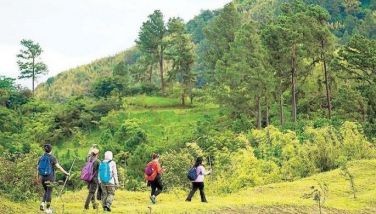Global mining leaders draw up program to address liberalization
MANILA, Philippines - More than 140 activists, advocates, and leaders across 28 countries are in the process of formulating a “program” that will address the destructive impacts of mining liberalization.
Clemente Bautista, national coordinator of the Kalikasan People’s Network for the Environment (Kalikasan PNE) said a people’s global mechanism to address negative impacts of mining is now being developed by different environmental and cause-oriented groups that recently gathered at the International People’s Conference on Mining (IPCM) held in Quezon City.
“Framed on concrete people’s experiences and equipped with science-based tools during the opening plenaries, IPCM participants seek to come up with international, regional, and subregional campaigns and coordinating bodies to assess mining plunder and destruction across the globe,” Bautista said.
“Under the auspices of mining liberalization, large-scale mining in the Philippines skyrocketed from 17 operations in 1997 to 46 at present and has generated P1.31 trillion worth of minerals in terms of total production value in the same time. Such industry growth, enjoyed only by a handful of mining transnational corporations (TNCs), comes at the cost of people’s lives, livelihood and environment,” he added.
The groups agreed that with mineral prices generally in a downtrend and with a sharp decrease in net profit, productivity and market value since 2011, large-scale mines have resorted to utilizing cheaper mining technologies such as open-pit and mountaintop removal mining, and drastically cutting costs in terms of environmental safety and workers welfare.
“The recent tragedy in the Philippines’ Semirara coal mine is the latest in a worsening global trend of mining disasters brought about by the clear criminal negligence by mining TNCs. Just last year, more than 300 of my countrymen perished in one of the world’s largest mining disasters in the Soma coal mine, and justice presently remains elusive. Now more than ever do we need a united people’s struggle worldwide to defend the people’s rights and environment,” said Atty. Selçuk Koza?açl?, chairperson of the Progressive Lawyers Association (CHD-Turkey) and legal counsel of the victims’ families in the Soma underground mine fire in Turkey.
IPCM participants also noted the spread of Chinese mining across the globe. Consuming more than 25 percent of the world’s metal supplies and accounting for as much as 40-50 percent of global mineral commodity demand, China is expected to affect the entire mining industry as it currently faces an unprecedented economic slowdown.
“China’s growing aggression is not only in the shoals of the South China Sea, but in the expansion of Chinese mining interests across the world as well. There are said to be more than 24 Chinese mining companies in the Philippines ranging from black sand to gold and copper. Both the oil-and-gas-driven maritime aggression and the mineral plunder are perceived to be linked to China’s attempt to bolster its industrial production, especially in its burgeoning military industrial complex,” Bautista noted.
The IPCM participants are currently planning resolutions and proposals to consolidate and coordinate various campaign efforts towards establishing a global campaign mechanism, including the plans for internationally-coordinated actions, solidarity and skills exchanges, and a challenge to the United Nations to establish a people’s assembly to address issues surrounding extractive industries.
- Latest
- Trending





























